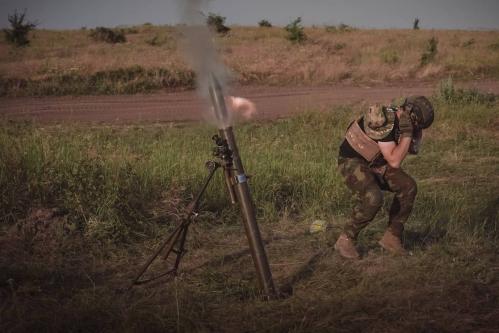Brookings experts continue to offer commentary and recommendations on the unfolding crisis in Ukraine and Crimea. See previous editions of this roundup here, here and here. Brookings experts will participate in a public event on Friday, March 7 that will be webcast live.
Thomas Donilon, former U.S. national security adviser and Brookings Trustee, spoke to a Brookings audience today about a range of issues, including Putin’s motivations regarding Ukraine and Crimea. Watch archived video of the entire event here.
With respect to Putin my observations are these … One is that for him, these concepts of balance of power, spheres of influence, are quite real concepts. And quite relevant to how he views the world.
Number two, that he has tried to carve out a distinct posture for Russian foreign policy. It’s mainly been though in contradistinction to or counterpoint to the West and the United States, as opposed to an affirmative policy. He has a long list of grievances and sense of threat from the West.
I think with respect to Ukraine, that he regards it as an element of the Russian sphere of influence. There’s not a real appreciation or approval of Ukraine or any of the former Soviet republics acting completely independent of and certainly not contrary to Russian interests. When the Yanukovych government fell, this was a real blow. It’s also related to this kind of fanciful view that President Putin has of a Eurasian union that could be a counterpoint to European Union. And without Ukraine even that fanciful perspective goes away. That’s not going to happen without Ukraine.
But the point here is that Ukraine is orienting itself toward the West. And he saw that and determined after the Olympics … When they got back to Moscow they saw … basically a key element of their sphere of influence orienting itself to the West. And he determined that he would do something to regain leverage in the situation to be able to try to effect the situation, regain leverage, and perhaps destabilize the new interim Ukrainian government. And I think that’s what’s happened here.
Clifford Gaddy, co-author with Fiona Hill of Mr. Putin: Operative in the Kremlin, responded to Henry Kissinger’s op-ed suggesting “Finlandization” for Ukraine, a prosect that Gaddy calls “a utopian goal.”
Gaddy also told Bloomberg News that “Putin has really got the goat of the Obama crowd, it seems … he’ll never deign to personally engage with a bunch of nobodies at State.”
Steven Pifer appeared on MSNBC to discuss the referendum that Crimean authorities aligned with Russia have announced. Watch:
Here is some of what scholars are saying on Twitter:
Ivan Krastev’s clear-eyed take on delusional ultranationalist dimension of Putinism. http://t.co/HA0cZUM1if via @prospect_uk
— Strobe Talbott (@strobetalbott) March 6, 2014
And @knowmorewp is also blowing whistle on oil / gas exporters’ Putin opportunism http://t.co/5X0UW81ITA pic.twitter.com/BcQvDsogQr
— Mark Muro (@MarkMuro1) March 6, 2014
Ukraine crisis: Could Russia Today turn you into a Putin propagandist? – http://t.co/yckSYR8qmq #GoogleAlerts
— Angela Stent (@AngelaStent) March 6, 2014
How Russia invaded Ukraine: aircraft, paratroopers, and – most important – speed https://t.co/0i38l9EVAq
— Peter W. Singer (@peterwsinger) March 6, 2014
Why Putin fears West rather than South (political Islam) & East (China): Cuz West is where inspiration for colored revolutions comes from.
— Strobe Talbott (@strobetalbott) March 6, 2014
Putin’s been pushing the idea of “Russia’s usable past.” Now we see what he meant & how he’s using it: territorial expansionism & revanchism
— Strobe Talbott (@strobetalbott) March 6, 2014
#Ukraine likely to push #TTIP forward. EU had been concerned US gas prices were form of industrial subsidy — US gas should look diff. now.
— Bruce Jones (@brucebrookings) March 6, 2014
Kissinger’s Ukraine oped is analytically excellent but his solution is odd. Russia’s problem is w/ EU deal. NATO membership was not on offer
— Tom Wright (@thomaswright08) March 6, 2014
See our research and commentary archive on Ukraine.



Commentary
Brookings Scholars on the Ukraine/Crimea Crisis, 3/6/14
March 6, 2014